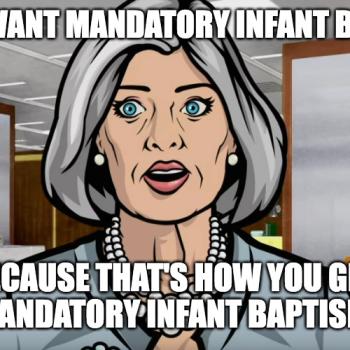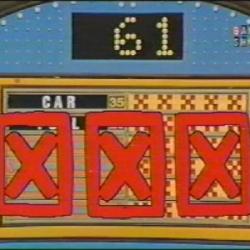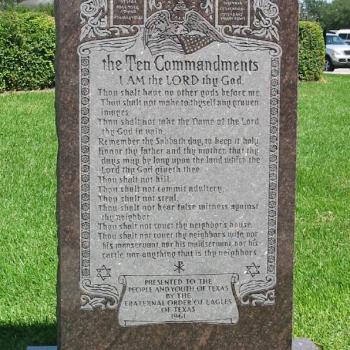In other church-state news yesterday, the House of Representatives voted 396-9 to reaffirm that America’s “national motto” is still our national motto.
That motto, officially adopted in 1956, is “In God We Trust.” It replaced what had been up until then America’s unofficial motto of “E pluribus unum.” Replacing an affirmation of unity amidst diversity with an expression of sectarian faith is, generally speaking, not a Good Thing.* But this symbolic step backwards, redundantly reaffirmed last night by the House of Representatives, hasn’t wrought much damage because frankly the designation “official motto” is almost completely meaningless.
If you’re wondering how such a measure could possibly be constitutional, that’s why. Because it’s meaningless. The House vote was a “concurrent resolution,” which is Congress-speak for “stuff we vote on instead of things that matter.” The resolution is toothless, lacking the force of law. Phil Plait is correct that Congress making non-laws respecting the establishment of religion still violates the spirit of the First Amendment, and that lawmakers voting for such measures are not doing a very good job of fulfilling their oath to defend the Constitution. The symbolism of this sort of thing is not good, but that’s all it is — some not-good, but hollow and mostly meaningless, symbolism. The Supreme Court even ruled that this is all it is, deciding in 1984 that the replacement motto had “lost through rote repetition any significant religious content.”
That Supreme Court ruling, by the way, does have the force of law. So if you choose to interpret “In God We Trust” as a reminder of the ultimate sovereignty of God or some such, then legally speaking, you’re interpreting it incorrectly. The official, legal meaning of our official motto has nothing to do with God, but is something more like “That thing on the coins, blah-di blah blah blah.”**
For the record, the nine representatives voting against this sectarian symbolism included eight Democrats and one Republican, Justin Amash of Michigan, who explained his dissent this way:
The fear that unless “In God We Trust” is displayed throughout the government, Americans will somehow lose their faith in God, is a dim view of the profound religious convictions many citizens have. The faith that inspired many of the Founders of this country — the faith I practice — is stronger than that. Trying to score political points with unnecessary resolutions should not be Congress’s priority. I voted no.
That’s how I would have voted, too, had I been a member of Congress — unless I had been able to convince my colleagues to support my amendment to the measure. I’m calling this the Shepherd-Balkin Amendment, named after storyteller Jean Shepherd, author of In God We Trust: All Others Pay Cash, and constitutional scholar Jack Balkin, who was the first commentator I read affirming the “jumbo coin” strategy I’m adopting here.
Yesterday’s nonbinding resolution “encourages the public display of the national motto in all public buildings, public schools, and other government institutions.” I would take that further.
My amendment would encourage: “the public display of the national motto on 2,000 $1 billion platinum coins to be minted by the Secretary of the Treasury and to be distributed throughout the nation for the repair, maintenance and construction of public buildings, public schools, public roads, public bridges, public pipelines, public employment rolls and other government institutions.”
With the Shepherd-Balkin Amendment included, I would enthusiastically vote for the resolution the House passed last night.
Yes, the hollow symbolism of the measure violates the spirit of the Constitution. But in exchange for $2 trillion for infrastructure, teachers, librarians, police, emergency personnel and safety inspectors, I’d be willing to swallow a little harmful symbolism. (In that spirit, I’ll further suggest that those 2,000 $1 billion platinum coins should bear the likeness of Ronald Reagan.)
– – – – – – – – – – – –
* The only people who think it’s a Good Thing are those who belong to the sect in question. Ah, but who is that? And are all those who claim to be members of this elevated sect really members of it? Can they prove it? How can they prove it?
Historically speaking, the answers to that last question always involve duress. Ultimately, the only way to really, truly prove one’s membership to the satisfaction of whatever authorities are entrusted with deciding such questions is by not floating when cast into a lake with stones tied to one’s feet. This is why it’s important not to entrust authorities with such questions — why church and state must be separate.
** Reason No. 2 for the strict separation of church and state. Any officially approved, privileged or established sect will ultimately become nothing more than a vague civil religion existing only to affirm the legitimacy of those officials who make it official. But then, for many American teavangelicals, “a vague civil religion existing only to affirm the legitimacy of those officials who make it official” isn’t viewed as a Bad Thing.
















